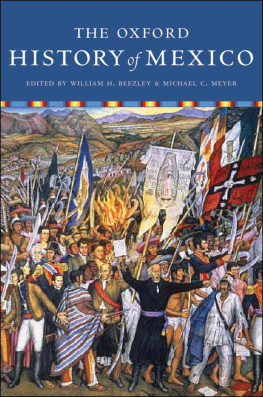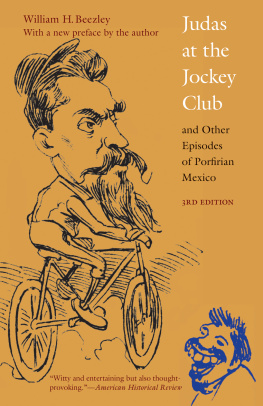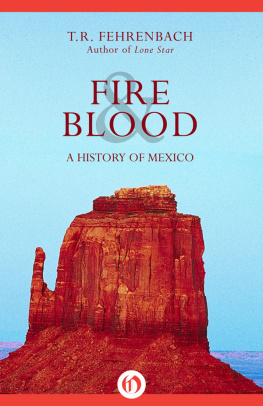THE OXFORD HISTORY OF MEXICO
THE OXFORD HISTORY OF MEXICO
Edited by
WILLIAM H. BEEZLEY
and
MICHAEL C. MEYER


Oxford University Press, Inc., publishes works that further
Oxford Universitys objective of excellence
in research, scholarship, and education.
Oxford New York
Auckland Cape Town Dar es Salaam Hong Kong Karachi
Kuala Lumpur Madrid Melbourne Mexico City Nairobi
New Delhi Shanghai Taipei Toronto
With offices in
Argentina Austria Brazil Chile Czech Republic France Greece
Guatemala Hungary Italy Japan Poland Portugal Singapore
South Korea Switzerland Thailand Turkey Ukraine Vietnam
Copyright 2010 by Oxford University Press
First published by Oxford University Press, Inc., 2000
198 Madison Avenue, New York, NY 10016
www.oup.com
First isssued as an Oxford University Press paperback, 2010
ISBN-13: 978-0-19-973198-5
Oxford is a registered trademark of Oxford University Press
All rights reserved. No part of this publication may be reproduced,
stored in a retrieval system, or transmitted, in any form or by any means,
electronic, mechanical, photocopying, recording, or otherwise,
without the prior permission of Oxford University Press.
The Library of Congress has cataloged the hardcover edition as follows:
The Library of Congress Cataloging-in-Publication Data
The Oxford history of Mexico / Michael C. Meyer and William H. Beezley, [editors].
cm.
Includes bibliographical references and index.
ISBN 978-0-19-511228-3
1. MexicoHistory.
I. Meyer, Michael C. II. Beezley, William H.
F1226.094 2000
972dc21
99056044
1 3 5 7 9 8 6 4 2
Printed in the United States of America
on acid-free paper
CONTENTS
SECTION I
THE GREAT ENCOUNTER
Helen Nader
Susan Schroeder
Ross Hassig
SECTION II
CROWN, CROSS, AND LANCE IN NEW SPAIN, 15211810
Mark A. Burkholder
Linda A. Curcio-Nagy
Robert W. Patch
Elinor G. K. Melville and Bradley Skopyk
Asuncin Lavrin
SECTION III
COLLAPSE, REGENERATION, AND CHALLENGE, 18101910
Virginia Guedea
Christon I. Archer
Josefina Zoraida Vzquez, translated by Michael M. Brescia
Paul Vanderwood
Robert M. Buffington and William E. French
SECTION IV
THE MEXICAN REVOLUTION, 191040
John Mason Hart
Thomas Benjamin
Friedrich E. Schuler
Helen Delpar
SECTION V
MEXICO IN THE POSTWORLD WAR II ERA
John W. Sherman
Roderic Ai Camp
Anne Rubenstein
The year 2010 marks the two hundredth anniversary of the initiation of Mexicos struggle for independence from Spain and the one hundredth anniversary of its social revolution, the first in the world. Mexicans have celebrated and will continue to celebrate these events, honoring national heroes and recommitting themselves and their nation to the goals implicit in independence and social revolution. In numerous categories, such as primary education, public health, political rights, and cultural achievements, Mexicans, despite dramatic successes, continue to raise the standard for national achievement. Expectations are high, and they should be.
In the decade since the publication of the first edition of The Oxford History of Mexico, the nation and its people have undergone changes that many regard as nearly as fundamental as independence and revolution. Mexico has made dramatic strides in democratic politics and toward recognizing its pluralistic ethnic and cultural population. At the same time, the people have suffered mounting violence, including hundreds of murders, largely associated with illegal drugs; witnessed complicated patterns of migration that include Mexicans and Central Americans traveling to the northern border; and experienced the almost mind-numbing complexities of life in the capital, by some estimates, the worlds largest city. Not just in Mexico City questions of traffic, environmental degradation, and disrespect for indigenous peoples remain. Other questions persist about the possibility of democracy and development if individuals lack human rights and personal security.
The political, economic, social, and cultural developments of the past decade have been incorporated in the updated chapters that follow. Notably, Roderic Ai Camp has reevaluated the politics of the past half century to explain the events that led to the dramatic election of Vicente Fox as president in 2000, representing the opposition National Action Party (PAN). His assessment of both the Fox administration and that of his successor, fellow PAN party member Felipe Caldern, allows a cogent discussion of the most infamous and stunning developments of the war on drugs that has resulted in shoot-outs, murders, and heinous torture, with hundreds of innocent victims across the country. At the same time, Camps chapter makes subtle reevaluations of the official Party of the Institutionalized Revolution (PRI) administrations from 1946 to 2000. These interpretive readjustments reflect his career-long investigation of political, economic, military, religious, and intellectual elites, whom he has called Mexicos Mandarins.
The passage of a decade with such dramatic events does not alone justify the revision of the books chapters. The opening of new archives, the development of different methodologies, and the asking of sharper questions based on natural curiosity about life in Mexicos past all contribute to revised understandings of the themes and eras covered. Ross Hassig has reinterpreted his chapter on the Spanish conquest of the Aztec Empire. Certainly the story of the arrival of Corts and his expedition in 1519 and the capture of Tenochtitlan, the Aztec capital, in August 1521 remains much the same, but Hassig raises questions about the occupation of the city and conquest of the empiretwo very different things, indeed. Since his first publication on the Aztecs, he has continued to probe Aztec history, its military, treatment of prisoners, defeat by the Spaniards, and the meaning of Spanish occupation. He continues to reach increasingly sophisticated and often surprising conclusions. Nearly five hundred years later, he captures the dramatic, brutal, and wondrous encounter and deftly explains not what the Spanish occupation would become, but what it meant immediately to the Aztecs.
Friedrich E. Schuler, on the other hand, reexamines Mexicos relationships with other nations from the revolution (1910) through the Miguel Alemn administration (194652). His revisions can in part be accounted for with the opening of Mexicos national security archive, which includes records of government surveillance of individuals regarded as threats to political and social securityincreasingly, anyone who opposed the PRI government. Schuler uses these materials, but more to the point he examines the often overlooked economic policies formulated by such gifted individuals as Eduardo Surez (working in various ministries, but especially the Ministry of Finance). Even more dramatic have been his discoveries in the foreign relations archives of Spain and Germany about these nations diplomatic, economic, and social policies involving Mexico. His continuing research on Mexicos international relations makes this chapter an interim assessment that brings out, in particular, the complex of devious policies that ultimately resulted in the expropriation of the Mexican oil industry by President Lzaro Crdenas (193440). The careful reader will note that Schuler gives a darker interpretation of Crdenas, one that at the same time makes him less heroic, but more human in his presidential programs.
Next page






